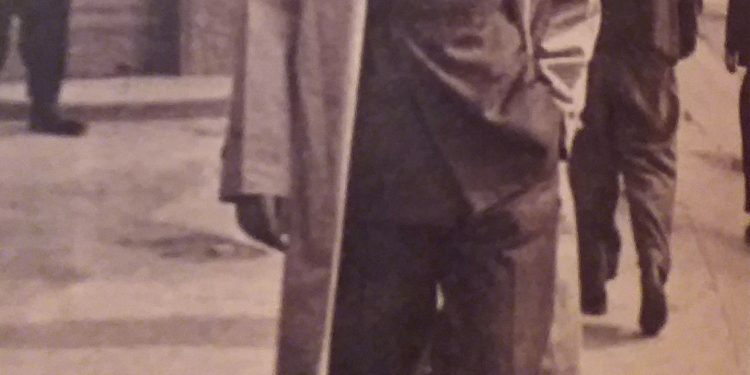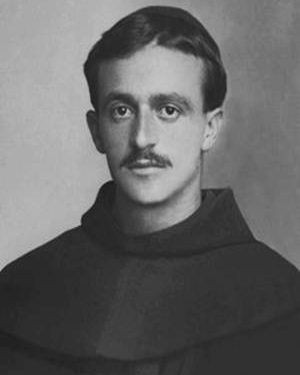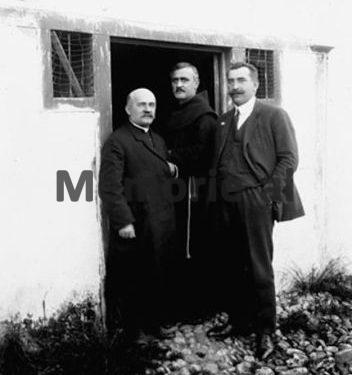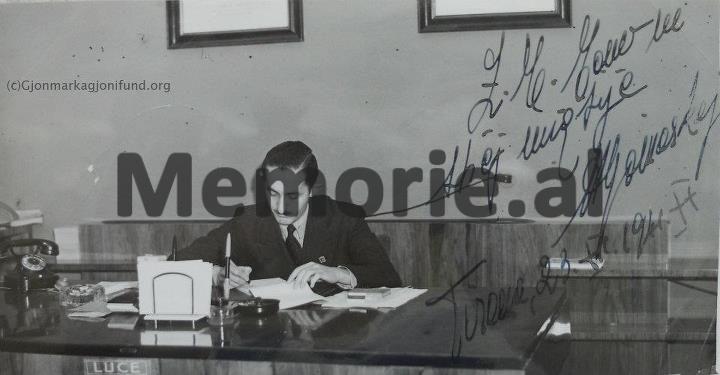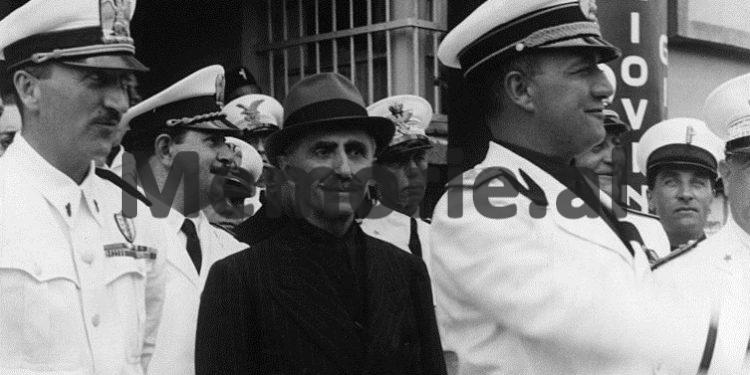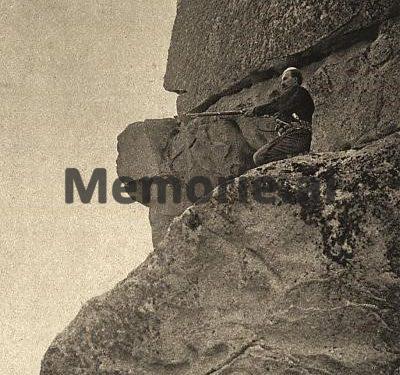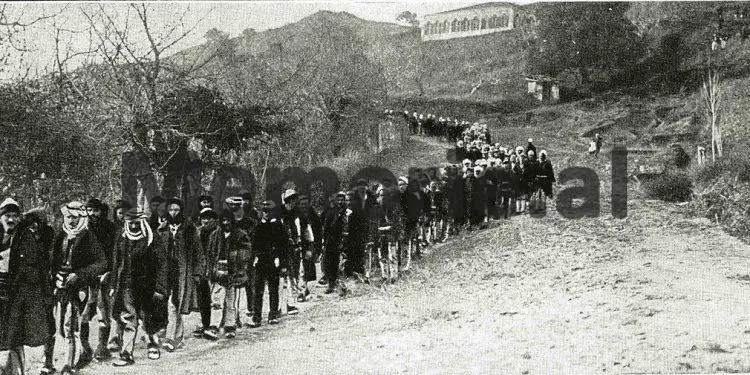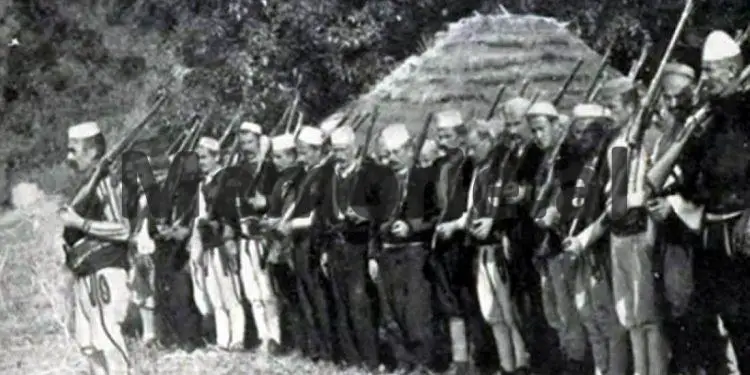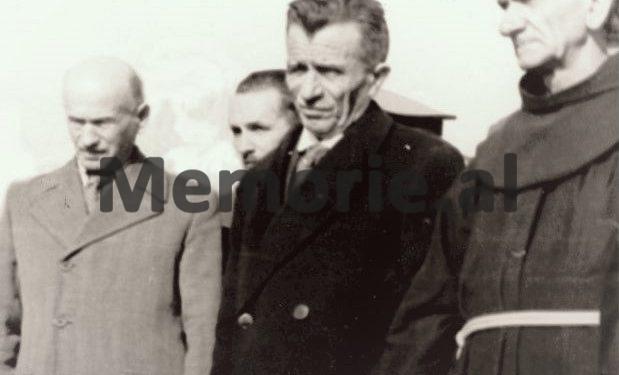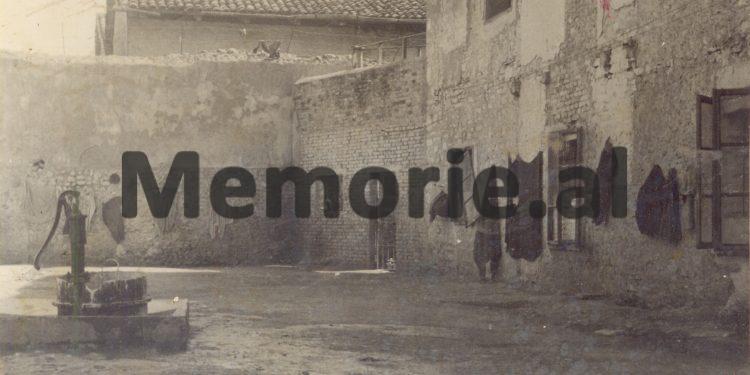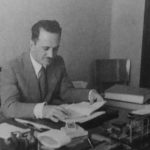
Ejëll Çoba
The fifth part
Memorie.al publishes some parts from the memoir of the author Ejëll Çoba, the well-known intellectual from the city of Shkodra, the sucker of one of the most famous families of that city, who after graduating from the University ‘La Sapienza’ of Rome in In 1932, he returned to his homeland where he practiced his profession, pursuing an administrative career, as ‘Dottore in Giurisprudenca’ and then for several years in the senior state administration, where he also occupied the period of occupation of the country, (1939- 1944), where he held several senior positions, as Director in the Ministry of Justice, Secretary General of the Council of Ministers, Deputy Minister of Internal Affairs, etc. His arrest in 1946, (together with his brother, Kelin) accused of participating in the ‘Postriba Movement’ and after a long investigation in Shkodra and Tirana, was sentenced to 25 years in prison, of which he suffered a full 23 years and five months, and five days in prison, in the terrible camps of forced labor, all the way to Burrell Hell. The unknown memories of Ejëll Çoba, which come with an introduction by his fellow citizen, the well-known writer, Zija Çela, present to the reader a panorama ‘painted with the brush’ of pain, where details and details are given about his sufferings in the camps. of the prisons of the communist regime of Enver Hoxha, as well as other accomplices, known and unknown names, such as: Father Bernardin Palaj, Guljelm Suma, Syrri Anamali, Ramdan Sokoli, Cin Serreqi, Father Karol Serreqi, Father Filip Mazrreku, Hamdi Isufi, Hafiz Ali Kraja, Beqir Çela, Musa Gjylbegu, Asim Abdurahmani, Kolec Deda, Nikoll Deda, Felatun Vila, Gjush Deda, Sali Vuçiterni, Emin Bakalli, Qani Katroshi, Sali Doda, etc., as well as some names of investigators, guards, State Security officers, such as Fadil Kapisyzi, etc.
Continued from the previous issue
Imprisonments
Memoirs written from August 1973 to the end of December 1977
Only extreme things can be tolerated
Count Rober de Montesquieu
- Did you know Father Anton Harapi? The mayor asked me.
- yes
- What did you have to do with it?
- Father Anton Harapi was a man of culture and I was honored to meet him.
- What man was he?
- Good man.
- Yes patriot, was he also a patriot?
- Yes, he was also a patriot – I replied with a sense of satisfaction that I was witnessing worldwide my reverence for Pater Antony, who had fallen victim to his national and religious ideal.
- Do you know what the people are doing?
- I do not know.
- What about Hasan Dosti, did you know him?
- yes
- Where did you meet him?
- I had him as president of the Court of First Instance, in Korça, where I was a member of the court.
- What man was he?
- Good man.
- Was he also a patriot?
- Yes, he was a patriot.
- Aren’t you a patriot too?
- I do not know.
At that moment, the prosecutor Petrit Hakani stood up, who raised his hand, with a resounding voice and the phraseology of a prosecutor of the French revolution, said:
- President, the defendant is a man of school; to tell us whether there is in the whole history of mankind an example, a single example of a patriot who has collaborated with the invader.
- I did not come here to display my historical diaries.
- No, no, Mr. President, let us be clear, has history marked such an example of patriotism? – and with his fists he fell on the table as much as he could, with squinted eyes, they blushed in his face. I was silent.
- The defendant says it, he says it! – he continued even more with a rush, you feel victorious.
- Peteni – I answered briefly.
Petrit fell like a planer on a chair, breathless. As he recovered, he sat down in a normal voice, he added:
- What are you doing to the French people, do you understand?
- I do not know.
During this time, the chairman and two members (two soldiers, young officers, who never opened their mouths during the trial), remained silent spectators. Then the mayor took your word brought by the secretary, said:
- Take note of his behavior.
And he turned to me and said:
- The administration of Zog and that of the occupation have been corrupt, they have all stolen, some more and some less.
- Someone stole a lot, someone a little and someone not at all – I replied with some distance and disengagement, sure I had nothing to add; and in fact, he left this argument with me, but, apparently, the mayor wanted to come out of an impasse, where he had been introduced by the unsuccessful intervention of the prosecutor.
Speaker: – Who is your lawyer?
Me: – I do not have a lawyer.
Prosecutor: – Where are your friends?
Me: – I have no friends.
The President addressed the lawyer A. Totozan, who said:
- I take his protection.
That was the end of the trial that day. The mayor and the members came out, and while the guards were getting ready to escort us, the prosecutor came to talk to us, as if without harm, especially with Hamdina. Hamdia said:
- Can we take that old woman, my cousin, to buy us cigarettes, because we are not getting what we want?
- No, but give the money to this guard – the prosecutor replied.
And indeed, we gave the money to the guard and he brought us cigarettes.
When we got back to the cell, the cell guard brought me 50 boxes of cigarettes along with the sofas, and threw them on the mattress. I realized that my brother, who had assisted in the trial and heard that we were asking the Prosecutor to send someone for cigarettes, had led me to think that in that state of mind, smoking was a relief.
The next day, Hamdi was interrogated. Against the accusations made against him as a District Commander in various cities, he tried to counter positive mitigating facts. For this he mentioned some facilities and favors he had given to the activists of the Movement. But whenever he mentioned their names, the judge and the prosecutor glanced at each other, and a person standing next to us would look at the mayor, slapping his right hand firmly on his left fist.
We later learned that they had been arrested on May 15, 1947. During the time of imprisonment, whenever it came to Hamdina, about the mistakes she made in court, we laughed because even if those names she mentioned, they would not come to testify his, we knew that in these trials only the evidence against had weight.
The next day in court only two statements were read against me. One was issued by the Prime Minister activist, Ndreko Zhupa, and the other by the secretary of the Secret Office of the Ministry of Internal Affairs. The first one said that only Catholics came and went in my office and that I had hired many Catholic officials. I realized immediately that Ndrekon had been forced to issue such a statement. I had him as court president when I served as a conciliation judge in Vlora in 1934- ‘35. I valued him as a clerk and as a man. When he wrote to me from Delvine, and asked me to find him a job in Tirana, when I was expanding the staff of the Prime Ministry, I took him as chief archivist. After the work during the Kruja government, it was voluminous and it was required that at the head of the archive was a man who knew how to keep the documents.
The other officials I took there were, Jakov Milaj, Sulë Demiri and Njac Naraçi. Jakov was suggested to me by the Prime Minister himself, who had a friend. Sul Demiri was advised by Jani Shuteriqi, who was a fellow judge and I knew that he had communist ideas. But I had never mentioned him and he left, to study in Florence and praised Sula. I asked him if he had the same beliefs as you? Jani opened her eyes and was surprised that I knew about her, and she answered me bluntly, no. Then I’m investigating.
Everyone spoke well of me to Sula, so I took him as head of section and then promoted him to chief executive. Njac Naraçi was the director of secondary education at the Ministry of Education. One day the Prime Minister called me, and in the eyes of the Minister of Education, Xhevat Korça, he told me:
- Do you have a vacant CEO position?
- Yes – I answered.
- Then I advise you to take Njac Naraçi, because he is very good.
Before I answered, Xhevat Korça, with a voice of prayer, said:
- No, Mr. Prime Minister, do not take me for granted in the Ministry of Education.
- Why should we take it, Mr. Prime Minister – I said to him? We find another.
- “No, no, take it,” he told me.
When I presented the proposal for Njac Naraçi to the Prime Minister, he explained to me:
- Xhevati wants to replace Njaci, but not to feel sorry for Ernest Koliqi, who named him and has a friend.
- This was easily understood, but I do not understand why he played comedy.
Mustafa Kruja laughed. Xhevat had a friend and knew him well. He was completely right to replace Njac Naraçi, as he needed a man with schooling. Xhevati put Henrik Laca. Njaci knew me in my honor, that from director in the Ministry of Education, I appointed him chief director in the Prime Minister, where the prestige was greater. Njaci, still today, does not know the truth.
In addition, I received an Italian typist for copies of translated papers that we sent to the Viceroy. We once had a misunderstanding there about a mistranslation into Italian, so I translated into that language myself.
Jup Kazazi, begged me to hire an Italian typist, that he would be fired for staff reduction. And I got it. How many and who were the clerks who had been hired by the Prime Minister, Ndreko Zhupa, knew them and made a baseless accusation against me, as if I had only hired Catholics.
The second statement had the same accusation and added that when I presented myself to the Minister, Deva, as Deputy Minister of Internal Affairs, was conveyed to me by Father Padron Anton Arapi, which was not true. Xhafer Deva, that I had never seen and Padre Antoni insisted that I accept that place.
These statements did not deserve a response, nor did the presiding judge ask me for explanations. They were things without randsi.
While only these two statements were read against me, against Hamdi, a witness came out who had been imprisoned in the Prishtina camp. This witness claimed that when he came to the Tirana Prison, his wife, to take an interest in him, expelled Hamdi, as the District Commander of Tirana, saying: “Go away, my whore!”. Hamdi replied by saying: I do not know either this or his wife.
The mayor showed no interest, as this evidence would not ultimately lead Hamdia to be shot. Then the witness, wanting to pay attention to his appearance in court, said to the president:
- President, why are you holding the trial of Hamdi Isufi and Ejëll Çoba behind closed doors?! Announce the people to come.
- The President replied – who told you that we are conducting the trial behind closed doors?! Anyone can come and point to the people in the hall, my family and Hamdi.
That evening an officer came to my cell and asked me:
- Where is the trial left?
- To speak to the Prosecutor – I told him.
- Are you related to Hamdi Isufi?
- No – I replied.
- Then he told the guard to go upstairs too.
Apparently, they had to release the dungeons for the arrests that were taking place in Tirana. I gathered my clothes and greeted my friends. On the stairs I found Hamdi Isufi, and he charged them. The hour of rest and silence had fallen on the prison. They were cleaning the corridors. I greeted him silently. They took us both to the same cell. I laid down the clothes. Sleep did not take me.
The person I saw most happily was Shuk Gurakuqi. I had attended his trial through the press and was overjoyed that he had escaped the death penalty. Although I knew full well that no charges could be brought against him other than his nationalist ideology, the fact that he had the highest office (Minister of Finance) among the Catholic Catholics on trial made me fearful.
That I was not wrong was later confirmed to me in prison by Suad Toptani, who had cried as a lawyer in that trial. He told me that after the decision, Koci Xoxe, who was the president of the court, had gathered the lawyers and talked about that decision, he had told them: “One of them saved us, we made a mistake”. According to the Swedish investigation, it turned out that the victim was Shuk Gurakuqi. They remembered Luigji Gurakuqi’s brothers. In fact, they had no gender connection with him. As far as I remember, Shuk’s last name was Rranxi and we did not know why he had taken Luigi’s last name. Shuku for Luigj Gurakuqi had a real adoration.
Luigi loved and appreciated him too. Shuku himself told me that since the Franciscans wanted to replace him on the list of assembly members in 1923, Luigi had vetoed and told them that if you remove him, remove me too.
Public opinion reached the communist judges who did not dare to insult them as they did with the 17 others. Shuku had collaborated with Luigji, in the Municipality of Shkodra, during the Austrian occupation. Then he became an MP in 1921 and an assembly member in 1924. During the June Revolution he was hospitalized in Rome, where he had last seen Louis. He had been told that he wanted to retire from politics and go to Naples, where he studied at a convent. Then he returned to Bari and reconciled Hasan Prishtina with Qazim Koculi.
Monsignor Mjeda and Padër Fishta, whom Zog had forced to flee into exile, charged Shuku to represent them at the anti-Zogist meeting held in Vienna in early 1925. When he saw that the meeting was leaning towards the Soviet Union, abandoned him and returned to Rome, to inform them both. In his place they appointed Angjelin Suma, who did not join KONARE, but the National Union, which was formed much later.
Shuku did not return to Albania, but found work in Trieste where he stayed until 1938. When after the death of Luigj Gurakuqi, Faik Konica wrote in the newspaper “Dielli” without respect for him, Shuku defended Luigji, with a brilliant article in press, where among other things he wrote “Faik is scratching his back for Gurakuqi’s stick”, alluding to the blow that Luigji did to Faik in Durrës.
When Padër Gjergji wanted to keep his friendship with Faik Konica at all costs, he had said to Shuku, for the article: “Have you measured the vein?”, Shuku had replied: stick!”.
Shuku did not participate not only in KONARE, but also in the National Union, which had a Franco-Yugoslav tendency. He had a friendship with Mustafa Kruja. During the time of exile, he had carried out almost no political activity. In 1938, he had asked for a passport from the Albanian legation in Rome, to return to Albania and to open in Shkodra the branch of the trading house “Prendushi”. Before his permission was issued, Mustafa Kruja wrote to him not to come in those moments, as the political situation was changing in the country. But after he got permission, he came.
He had received the first news about an Italian landing in Albania in Vlora. He had gone there after a business trip to Korça and Gjirokastra. He then returned directly to Shkodra.
The landing of the Italian army on the spot had shocked Shuk. He was anti-Zogist and wanted a change of government. He did not join the Dukagjini Movement in 1926, although he had friendships with its leaders. He also refused to go as a representative of Shkodra to the Assembly of April 1939, to hand over the crown to Victor Emanuel.
He thought that Italy’s help against Zog was necessary but the invasion was unacceptable. For this reason, Gjon Marka Gjoni had called a part of the Shkodra parish for the list of assembly members. Shuku refused, followed by Hafiz Ali Kraja.
Nush Topalli, with tears in his eyes, had explained why Shkodra did not support the union of the two crowns.
One of those present had told him:
- Do not say these words to us, but say them to Melon, the Italian consul in Shkodra. I will tell him, Nushi answered him.
At that moment, the secretary of John Mark told John that Meloni was coming to get the list of assembly members. John had taken Melon to Nush Topalli’s meeting and told him everything in Italian.
Meloni had replied that these requests exceeded his competencies, but he had made available a plane to go to Tirana and to meet Ciano, the Foreign Minister. Gjon Marka Gjoni, Anton Harapi, Ndoc Pistulli had gone there. Nushi and Hafiz Kraja did not run away. Shuku told me this in prison. Anton Harapi told me how that meeting took place. Next to Ciano were several Italian officials, including Giovanni Giro. The latter had been the organizer of the youth since the time of Zog.
He had conspired to overthrow Zog and had taken statements about Italy from several people. From the Albanian side were Gjon Marka Gjoni, Father Anton Harapi, Ndoc Pistulli, Zenel Broja, etc. Ciano’s reasoning was that the events in Albania were a link in the policies of the axis and that Italy, having a foothold in Albania, was safe in the Balkans, etc.
And that the Albanian people would have colossal benefits from this, etc. But John Mark John, told him that we did not have the word like that. We needed Italy’s help against Zog, but not the conquest and unification of the crowns. Father Anthony, translated John’s arguments and added to them his own from the intellectual. But Ciano insisted even more on the nature of the new order that fascism would bring and that the people under it would escape communist misery and plutocratic democracies. John kept the fact that we did not have the words like that, but Anton Harapi argued that the desire of the Albanian people was independence and territorial sovereignty and that our nation would not accept any invading order, no matter how good it was.
The guarantee of the words for independence that according to Ciano did not endanger the union of the two crowns, John and Father Anthony responded, but after Ciano’s insistence, John Mark John addressed Father Anthony, with these words:
- What do we have to do, Pater Anton?
Giovanni Giro, who was standing behind Ciano, said in a low voice to an Italian friend who was next to him:
- A Catholic priest is asked for advice, but he does not give it.
Father Anthony heard these words, clapped his hand on the table, stood up and said:
- There is no room for me here! – and started to come out. Tue passed in front of Zenel Broja, who was behind Pater Antoni’s chair, he said:
- Now save my head, Father Anton!
Before reaching the door of the hall, Jakomoni grabbed Father Anthony by the arm and placed in front of him a figure of St. Mary, which he had with him, he said:
- Please, Father, for Our Lady’s love, return if he apologizes for the deed.
Giovanni Giro apologized and the conversation resumed in a different tone. Representatives of Shkodra agreed to participate in the assembly, but stated that they would make a reserve statement there. That’s how it happened.
Ndoc Pistulli, on behalf of the assembly members from Shkodra, read the statement compiled by Father Anton Harapi. I do not know if Xhafer Ypi, who chaired the assembly, put this statement in the minutes of the meeting or not? Only the assembly members from Shkodra had reservations about the union of the crowns.
Father Anthony told me that he kept the original of the statement. But I do not know where it ended. Nush Topalli did not go to the assembly at all.
I have not had the opportunity to read Ciano’s “Diary”. I read in the magazine “In the service of the people”, of February 2, 1972, these words: “… Have lively discussions with many proud people of the country. Those of Shkodra, instigated and processed by the Catholic Clergy, are the most criminals…”!
I believe this is the best answer for those who say that Catholic clergy are stateless./Memorie.al




